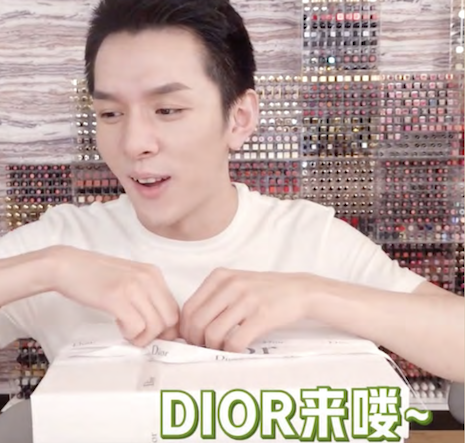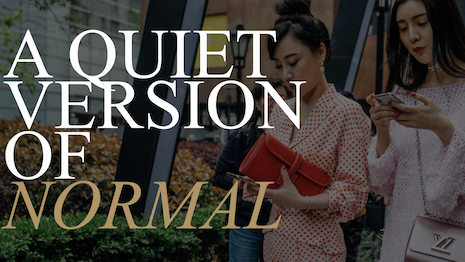Affluent women in Shanghai are finding that life is slowly going back to normal after the coronavirus hit last January. This hints at a new normal that includes socializing with friends and even going to Disneyland.
A new report from Spark Ideas and Gusto Luxe looked at what is happening six months after China shut down for the COVID-19 pandemic to see how purchase behaviors have changed or stayed the same among luxury female buyers in Shanghai. While consumers are feeling positive, health has become a priority post-pandemic and getting body temperature checks and mask wearing are the new normal.
“Despite feeling fairly secure that China has the virus under control, Shanghainese women are showing signs of caution with spending on luxury goods, particularly with RTW purchases," said Malinda Sanna, founder & CEO of Spark Ideas, New York. "Financial uncertainty is driving some of this hesitation."
"However, it is also a function of the fact that socializing hasn’t 100 percent returned to normal," Ms. Sanna said. "Fashion is an expression of joy and vitality, and luxury buyers just aren’t there yet. Some mentioned the fact that they’re not really dating or going on vacation, and they’re simply staying in more."
"In this study, it was moving to observe how similar Shanghainese women are to sophisticated luxury buyers in the U.S. (whom we have also studied during Covid)," she said. "Finding comfort in domesticity, focusing on smaller luxuries at home, turning inward to items like luxury skin care rather than outward-facing fashion, re-imagining travel on a more local level, and feeling that jewelry and timeless classics are the most relevant luxury purchases right now because they feel safe.
"Women are returning to stores, but it feels like work. People don’t love wearing masks, particularly in the Shanghai heat."
 Livestream has been surging among luxury brands in China, and influencers such as Li Jiaqi (pictured here opening Dior) are becoming stars. Image credit: Spark Ideas and Gusto Luxe
Livestream has been surging among luxury brands in China, and influencers such as Li Jiaqi (pictured here opening Dior) are becoming stars. Image credit: Spark Ideas and Gusto Luxe
Digital rising
Like in most places around the world, as stores closed, affluent consumers in Shanghai went online to shop.
To connect with consumers, luxury brands have been experimenting with livestreaming as a way to bring the personal touch to customers at home. This trend has even created popularity among those consumers showing off the products, bringing stardom to some of those presenters, according to the report.
“Recently I watched Li Jiaqi’s live broadcast, and posts on WeChat moments,” said one 50 year-old stay-at-home mom interviewed in the report. “He is China's lipstick king.”
But while brands are experimenting with this format, it may not last beyond the shutdowns as these consumers miss in-person luxury experiences.
"Live streaming has thrived during Covid, producing rockstars in unlikely places, such as Li Jiaqi (the Lipstick King) whom all brands are now supplying with free products for him to promote," Ms. Sanna said. "Many beauty brands have done well with this, including some luxury beauty brands. Live streaming despite having been around for years is still in its infancy creatively and needs to become less QVC-ish and executed in brand-specific ways."
"Louis Vuitton, Urban Decay and Stella McCartney were all spontaneously mentioned in our study by luxury buyers as examples of brands that have experimented with live streaming this year, but the results seem like a mixed bag," she said. "It’s currently rather one-note, and does not feel exclusive or personal enough for luxury buyers. The experience perhaps needs to be supplemented with the personal guidance of a sales associate who can reassure of value, procure access, or even just provide the personal nod that someone is making a good choice."
"If there is one key takeaway from this study that should resonate with luxury brands, it is that anything mass will not succeed with Shanghainese women. If it’s too accessible, or if anyone can get it too easily online, they will move on."
Health, beauty and vitality has become more top of mind than fashion and consumers are buying more of these online.
Luxury skincare is a core category in which consumers still feel OK spending money. This is a category where many of these consumers were already used to making purchases for online, at least for replenishment.
Fragrance was a category that these consumers used to make themselves feel good while cocooning at home as a way to escape the challenges of the outside world.
Now that stores are reopening, there is demand among affluent women in Shanghai to try new fragrances.
As consumers continue to be concerned about the health crisis, many are looking online for new direct beauty channels from which to purchase. In-person shopping is still preferable for the highest-end products and for trying new products.
"Ecommerce has been strong in the beauty sector for years in China, positioning it well for experimentation," Ms. Sanna said. "Shopping with friends has been embraced during Covid and the desire for it doesn’t seem to be slowing. Chinese women love digital creativity and entertainment and would love to experiment with VR to try new color makeup looks."
"Fragrance brands can offer new products for home fragrance. We heard multiple mentions of the desire to make the home a more sensorial experience," she said. "They are looking for flowers, incense and aromatherapeutic oils, to refresh the home and create more comfort."
 Shanghainese women were already comfortable purchasing skincare online even before the crisis. Image credit: Spark Ideas and Gusto Luxe
Shanghainese women were already comfortable purchasing skincare online even before the crisis. Image credit: Spark Ideas and Gusto Luxe
Travel remains on hold
As travel remains on hold, so too does the purchase of many luxury goods that consumers buy while on vacation.
The report found that many affluent Shanghainese make luxury purchases while traveling abroad. The selection, lower prices and tax breaks make it more appealing to buy luxury goods such as handbags and watches while traveling abroad.
While they are remaining closer to home and forging international travel, many of these Shanghai-based women surveyed said that they are buying less. Still, there will likely be pent-up demand when these world travelers head back overseas, particularly to Europe.
In the meantime, luxury brands could look to local Asian markets to promote goods, as many of these women have plans to travel within Asia.
"Luxury brands can take the opportunity to revitalize the level of luxury service in boutiques within China’s major cities, prompting more excitement and consideration of purchases at home," Ms. Sanna said. "To quell the yearning for Europe, retailers could create events like high tea or wine-tastings away from crowds in special venues to prompt excitement and fight lethargy."
"Likewise, there is an opportunity to strengthen local pride in Chinese traditions," she said. "Luxury brands should look to blend their DNA where possible with respect for local culture and talent."
Sustainability has also become more important to consumers. The pandemic lockdown made consumers feel a closer connection to nature, and many see sustainability as a way to protect them from the virus.
Still, some admit that even if they do care about sustainability, it does not always influence their purchase decision, which is often more product-driven.
"The pandemic has touched on something in women’s hearts that is making them appreciate nature more (even within the city) and drawing them to brands that are creating sustainable practices," Ms. Sanna said. "Many mentioned a link between sustaining nature and preventing future pandemics."
{"ct":"Dbvl9f08Ho8+07+KbNMSp0hQYPf2Ig+vhkJfL+QfMIyenYU0bTfO3S1aqbp4v6ryhJTw3MVd83dl0G+e7znjBNkWoSwNX8sa5KeAiVwoPguGHr9lx0KPJq\/lEY5sS\/RiEfYbl4uKDC29R2nIGSC6U56Wa\/RIDKYX5jQdNgHpuPUN5IXHuIqHggR1IKU3+N+y0ARMt8morzANH1Hm91l9Ghae80FZN63F8bkh7FDSpw7qMauqca5Rj47R4+302p7qJDFGgOKGpnYAlnR\/yvRkvCdrvrhdf7N7R21U0SSX9iIoo2q+xWCbLuO33BAEhkS2FrtN70ybFL+83RC2qSr4opei2kvveBqT9JOxGA65S+uUap9RwEn6EI+HRRq9a7Otgh3+Za9cG+j1UooWF36v8IRoTFYiS\/4IXJviuZQREw0BuHKqPEAxa+IUaiYKbOzxwwGYpoibr+TFtUb+jgF21vvnzQjqRoCx4qkZy591L9VEI7SDGIlruKkxIzED28zzitU8+TMNZhhgebffaKHbKtCKSf6FjZzfj6JedWOyzEPQXRqKWo5mNSfmSEo+45TD\/lEN9h32bMMWmxn\/a96nZYB5lvW7cJfoGgj1r9HKeqDRjzEHjGr6CnAF1jeg7Cl0Rb4tRbq6fJUp1kW4KOfwMXktA8eioAYPXsH2U8Z3Vf+xVUoXaq14TDXC3C4JJwS03jV\/KoK4CztGf+NC8gXs7eu3\/bCcSv9NXhg8aMaLi0jVy7Q92\/MRGLPDlwb\/VGgqMf2r9bjR5rZR6u+pOAwz4VG67t4RBi7Ra65V5zMVuvVgFk91jIEn7\/o+XIpWxisQlDsSkgfmXyX636miGrS6nMNA9pQcYsxcLGMEEomONFd0EfPsuKqAuA628DWMhNF22HgIM0LbaKXKi5RxVYJhVdDSEp9ZrxSErwQvlWLSI3O80CZC7b9ziZ6bO7ltP7uwW19znkiR9lHZpZI58Xx3YirkqvqhSPcNywasILMv+MtLfHB7v\/RCvhYL9i+UF9UIGMH6EIR+29GASJ3+Gul3NAXq2bx2Kxm\/++pmpXdWT5JQpZtECFd\/WBT7GPp3pLbTFUkaq7Hju5GtoUkTa5P7Wr6rxdiv\/0a6lfTQwOJSpvqpgAVxxSusxiLZX9f8pMnPOpaRclST8+D8ZJt+isRCBoO8EiL2E+saxwvKCKPLycmWNu7eIQXFthTCbt1AKgqamtMHMJUiS0o+A7P+0pVrTABw9GJINfVA9vcVZzJ5\/aK0MXNz543pISKrxTe+66w2T9QUSumrRfZQTcqoCFpeSHgzWEBuukVjHmqHJAGt2QPapaGfWFZNVXUadf8FUJQ7Oq4tf31xzRhGntqqxadojuLbLPknkzxL\/dLQaXhcBPw3L6RUI4azCJ3RQNCctMJ3ulGG8iMWSfG+gMlS5iPVPB6irbu3bBPwy6ZiQbRgbMp76Qit8yyIr\/\/+iklC9+YOCq8Rvzh15lUeLSZdMz5pZFK3\/LqbY4SlLEn8\/MvhlSJVy86zeIKBz8Ww+ZfVUgrpGhQgwwb9+bE8V9Y04mqaUlHx7EUVInhU9QOusnsGVef6g+KndaAgR8vDFFwuTbetH5cF05fqab3N8M05\/mg1PKxqTubX9DZc3rPokH+wjxbNPXE6t9xI\/2FoAoqyVUNMop9b1tsZtB5ZxwlHhTgHQRhTCVeBkXcd+hIy+C+MDqjq0gC0k+3SM2ySx9L+Csut2Re2SSWw2jCDm+FtP3ZqDr3tetWz7\/kDAQV65zRYdooZSste1pYO54BwP5EB2VHRUZeFRQiN8uQvGoZ\/+ub8Q8I7qFA15WNsTeozxs2h6m6hqOti4rXD6DfDYSx6jxDM0zGxQF8RZZIHm2X0204w8RH6l\/JepSul2SRjUlzB7fSausO91bNCvp72d0X+RnDbBZ8hXWPUs1dc7CVqMY1aOby7hnpstm8mzNtO\/gHXbV86RfUKmQTnzFb4RXhe1dOiMzq2OR5WmVi8xVr7TW3R\/9H5h34uktPWQsXahFkj6nszsdWu+XkZcC118DPzbibdCaLfoExh6HitMx0cvv\/cZHQ++hN3nSX\/V9ZqE3Yh3C45X\/ss\/uisyLsbFKWQJmbGCUs\/V7OfawakzXLRIi3+jjD405VHNv6EqCRXC9QIgGeUwlVF8A+7Bt4Tgm6vrGlipYFf7zwLzG0oUISrwiB+c545jh3qcq9S5I36f6hgIvGvdb8XzkIjOIX6LNuWDAiA8lhBwB3i5hBOwiW3\/VAyFAk8PkdH9ZVvgeOhgvF+4udmLz6IkNigAo3RuTSFPpSKpgS2ei1iUxkx9EteKPMoiBL2RrzV3U6FwTnNQpMXxnEOE19SJZSY+3uOriVvoEw8oN1tO+fXRuM5ZqDWhDYRD8AsZ2VWKtKTMwMeFaBZhjcQvWMOWJsZ3tbqSm8x1tehTie3cFxOQPxSKBw8wDvaBADe55EyW7sAhZACsynHKwqCYDZXOdV7mr1EgT5KgxKcWUi1N3uXV1nhQ9ZdLaEBA71IbsDfz\/7Bm6Th0PSwRpkxkaQ70w1cBUYQTvBnpmgl2yKaZJ\/cIuBOscexXz9Elw8mvu9Pqep8WmksuTzOe3tqQ7+Fg9PREyHcIkf4jnCqNBuLOvOKsXTutAbNhSD8oX5Yp6Gerb42JJDGeF3hEUDxN5\/Wo2WM2UslMNqNIXGwi1jzKpMh7KOGXEg+f9tnAGZkCYNVgL1kldsBsKqi\/kzaZByojRQofwy\/DbxDMknyPOW5rFHZayFuBN21mKTlztt4bVXuY8r9x5uNtghvGRKWoGyhvw3Rk16hxOX3ZSbUtN+cnBFQVYjHCb1xx2WF9ffTIkdzFE8Jbg4LmPySyt417aLwlmSrJg1+WMOmdhvXJ1MO+Lxpq\/KWSnkCxpUKnEFaddL97e1bbcBesGUdhL81scTa6XJkEUNP+5f8u3T4pESIrLlniuyxg0em0TOs2Bzlvgf4hkXvXmx7v7k2zOOtvR+Scd6riDV5KB6ArADqy66ZUm0d19WTsRhry6mJEab2xqGPu5QAHQBPMYoRML3LUUnbbklVIljiF15C85tpti5CAq4kFS5Q\/zH20qkMLZiBjAVNggI08sLbIwzMIu82Yx\/ucrKTOEUlSALafFRZtSQnfljrEPt+3\/RJHi7ypTESk+XfKrji6oHGl6KeRUuLxiohnY0cca+KfUiyTySG3SLH9r7LEmY56YLGl+1VaXqkB+UKofCNmaT2faMEefMb8ywhMfHzb3M6KzelNAnS4j0B70ut01akr9mNe2G5OxCIzz7YEV1U1mSfTi6uCPosnC7cpQLwk64FzhDGkBbgAgY+HeUjQyBNl9evupjBubgMPXmnUTeOluUUXVhM8eLdFcMqIZXg27yiHsMtX2H23B5z46BbnGUA3cXmHzO36eHmYZYANWpKXEH9AGmx36ivXwplWs9U7cr+sAou3QF9YciHlje8lmnAoBkSgo3XA+WkdvgAUJa95kMlZDO9mHfXWZcIgA1JePvfjrzIqbFDRS6KWOJBFXO09J+YB+EA5nvvM\/bqG1qoXsIYqY7Iel17VSnw\/6tKW7s7MXBUlC29DMXKicfMkGJAWwypNw8A95LkGNAjk1vlzFEBLoJSpRzivTENy3XDlZJJpduhuPwT3xAxFe5T3u595EyQyMP9Vpgs+yYjjX6AVSljPTcsg\/UF9h0pXPMd2FqpiWmPmmmoI4e8m9JDl60Jutk\/RcDj1A7\/LGb0bb5nTJ9FtdKHhvEl5UXm6iVmyeow3HOs9SZS22eZRf9RB\/lU6krJU+M8qRFeb4XEju4Q2pxVPeB2L5NykBJcYx32\/fVgA5pd3CcmBhabudJ5kj0g+HjNLNH56XmNfuPLsdK5B864BPghAchMc7v+VK+SxtcHPQwRHRv8\/wE0zvutOhcq00VjojvZeAn4fqJb63yxlJQlHVB0EOnuf6X5IMvIjdn2MXFkhDsFNjwYFwuQtUpneNcQOj26u5GNq0vq6HXd42mIUW6y8qXk1TBBrIwPzYFVfIV5MGBh7Y1xnt20VJVy4W5CJrFYKgf6pj2waypCQGWpQD65dKcBSEDL7mgWCSi5WP0t3VW82aVEMDPs1EHovjHI1hxBFCUYisOfxuhC9IaPHeUvy4qPgBbyM9R4NUklIQjpq+ugK\/ttL2aJ04fQlguCl2hT+4X8hKrPQz73rkxo4nf1TZciD5ZvG\/le6GwkaVjzlyc3QMnc2BjEdIfVHSOjYYCr4dh5I9z+tslHlnXrlxpw+xJlGW8Cpo3eUSYLq+Tir6m1jd9VJiOoKCVBK2dpw61bmfJmbUgk01HXZ8Cj4HCsrWMRHJnMGidw0SZUgd\/2UcrYtptJBa5Y3mqEeYSssIhHYH5gvHJUVk8LxapoCdlL3O1U+VXwkY\/V5HJ2HaXgi8a4KAl45i77VNQoUiG\/EXSdce3UQr9FL4R66gpApQvIjbaAJrd3C1+BBsxM5EtOqKMVc\/J192oqy4uiBfbT50YtOJkyLZGFrE3e\/aoSO+4DJH+Xv6oeRWrHit7w5myspKHy2cBLL7nUVVa0jKamgbJo8Xxf5rOa3WO0yPMgwxpSRtQlSw+1TuUkgEBUTozzai+xyjHHhyxCp3aD7+f58v997xtZ+HEyJM1P00o8iGAPZdcNBnOtJxM0xrSB+BRbHoxPWxtvKu6UAqZuFIA4qTZ85tDNHhi2FHHSrZTt6mlZ4i5mA+QwQPEX2Ex8Kf\/prkh08WqGH\/E5J7DLjjIk2891qJUrChiuMNXSOJVAzIeKgBCQAZxumPdkX2MGhhm1c\/keEcPlwlJLX861YpIUiurizmxAxiPvNQ2qebhFHBSUvZkGpnPhm\/7z9ooXiabefhWeq1ntaTkGO27hOa+ISib9HbYXrsWe2QCIeTzWd2DA9IfC+aYyUICaoNALYqMZiPhQTHA4k6lG20q1CrLF0hiy2bfWA8XZz0VWLIf1k7tPRYGC7vUgKURp5MkoCXbOlWCoxqKUP0QTUMeoiBwtFxl4gAinrs\/wsas5KD0zVYh\/S21\/51Gd8TExUoUb2hIbRRY2lUaG64SXcwNGGWYlOIsZEq2ZNE17QNOYDl43eaCoAfJpnKlOvthJlGcpbDXxTqeXxs9myLeL9pMDZbfM+3K1Gxh\/doa2kuadBEc4jE6ftjUz2NRyVCmkecwvX0naxG9AEr2RBETYjwv4kaNQGjpbbTbY4NtCQku0mdO8SAqtmXPBO9FUmZF0YPTD3HpC4ZxtIS0nUoo2dcTeKrOR2KfK+N8FIUZyOymd0iQtYi2S8omhR5dsTAyyztY45Cv0OnyVAWWOSehy4LCTQSrw\/GtyG\/R0VvrmE5AVetNSCPKzBv33bW7ByOZSBO8+GHW0cVsjEOBgbgEQUl3u+0XP+H940CB6jUu3Q\/wHsfuALl1j2D1AFhAT0FjnaH44RAIpKDF64viEBT65vDdDDb2ZRWG9I78Kl+HuavREDn239CTm8mKjGpnvd6tY0L44mJCFteozHy7MAEAPli8rMcA5ya6VkqLR8odA5M3nnvU0vvlcYHnb0m9MP5rVWayQGtTfxtFTsOAoPJF45Qejz7nz6WSqa9irrf+sAKMv6wRJiOd\/Fc2pP7K7jJ+COrWmRLLzGhTfrwo5D4GjhdXJfrZMQZwsP8F8in4gt14HB2kjNRoMjVM6NMerUBT\/7o9nixnCXIZBr2Re6AlvIBpMk+u235xXZs4kA6KFGfJakQMj+nazNXCn+vKA2UrLWfjXfcIan+\/KYBH+AhZ3KRl24CaOWVzvW1VQFaUsLdBKm1e1WCYwCg5CL+E0IdDqpMrsE45MHOUntv822YZHrgi6unCHHv+rGowKZ1yjGgotzOBwpgbrzT4IJ7L8og6PEvwAFHcxRrcOdhNDj8OeGmI47JyjTr8ClBmqhApbt3b6iIoD6nz6WqgjI8WxEt8PLY3\/BY+wNrVubnxH4BTWNCoo9hq5WYw4owvi1XM3lXBuH47IZQGJnMCiq8EsFi5b6DrkfqoRrKpLsPHO\/APbWhwRq7BEhVrGuBwDWECvyC0QKUmaiD7U1g87zC0SayT3E0UhWKnSnnfIQrg0ryXfQ0Td\/f1+W6axlQyd\/\/oBrd69TnZbpeds2rQH1KBeHDmu\/3BD4klpfSIM4Tna2s+CsXlUJe26iF0joBTGCEBWpQ8IQ5pGCPJc8EaEaJilOljER5UiO5s8KDc4\/5H0FbOvTmVwF7csGCXUz3YhiZUsf28mVs2s5aLqlkD4pf4C4Z9oFkBmS1Rih4JvD0XzdSxwV8X\/N9zz\/yeGsnBxbJkq7yQQr7FCIiou9sbBv20diywZvy5cgrH8Xi9z6Pz5QOaQ0LQyuuyiXn+sF1BOMfhfSwi+ZSdxCK3HOZ\/aPO+BOzbs4QhbQaseeLXHiOxgf3B6SgbKktZKPPB21lvxwyQ5nJ95n5T9\/xNwDH7u63aNV869JS4pSuzcKXNCvuysn0AuqTS\/8ZXhmOBZjQ4lY8kXIGb8JL6z3t2dCC7a6TPNRIWlL1O\/mB0py7HfoPTCQBuiZPYQxU5z55rJzuWo3YGLU5bER98CLMpibONvXsn3YODTf2K6VmsWYjic8r6rhHXUZopD9Z3Wr\/MN\/AM5JVCE0hUGSEeele4CXPq3AUpGDOpBf0hNKwo7FSrGzUjHG8I9CraR1cWJIZR+zZsqDePdq2SQl0JC1mM9btbsZRgJdEHy94Dh3giw5IHNCWtARTW7yOr0TIrI3NOQTpWggYlqlsGPUUs3sqiDB5VvXx3EgAj8aGfOYuLJanKVX5N08ciwH3rxslesyZohCPXXwJq+0LFVD21pBYl10qmNf0BferQB2tUIyFNWDeVL76CVOrKBD9hFEsA4BcW1aBr8JYTKtOFFH0j8mneEgPuGldtRBWKop9pErFRNfVkME1y3Cs0YJIH8Fz3AXdt5jvWgNqQbshnPrCbfAntK4VozFdp8j4JvIyFs5Z6j+jCzx9X87r54zLW8h9lyE1Bi660ACXqDaGv3KOEw4t9hyf511tMzxY++cFhyCZowpV16YHE6S0FqFVMC4yPNavPE00mvYchKLB+E9sintcNfKPxlKxR8tAyF7QPze2ml4YJzUlq2Abu8vrBsBlItTru9xjUTvq586ChscIhkOxYaNwyEIxQTWJMn+4RetYuC\/S9q+QIDDJLXjNLMmKMvXmO\/pgfpHUZ8oJDaaAkCKIvLXdHZA3Bn6YK0ZRtkf8gwT8ZX7bo\/zjIqx9BoC5AzQuhDlTfK\/oPhlrmAT\/EbyA+05tO22IQC4pShSWcJxgY2ZEwX7K87pid42GGypjALhh5ysBJuWY2XR6nYIP2SRyMkIPIFyMQgcm4fDOAVAXArHQaCeOELFERicMP9RwzQOE9qtDo0XgaoaNxRRFvvzshG3NWDU9gerCvnzw\/UoJ9pShYNpbEefUDdF27Jk0RZT7FwNTI4S7Mv1+8lq1e0YVs6Kfe6UtetZMd7QORy3f01uHHVwiXlFsMWwecXfTwIjQ0fV\/7RqSL9TMMWWFZYvaiuGNLz6P5ykBotCzRwED3DJKnP83ZWXshs9Td1af9C+VB5stg7sdmZ2GotMkyHdRxWz4PU1LiAntGBqMjFjy\/n9aSN\/SNHqfaUBI9o4PT5zJUCfoOGecxA0J24C8c7aujLcTcH\/KmsMt1hpBQBEWq1nwb9H6yvZKcmAWHp+w9k8VIGW7QhN8eBwjplUGjiyA8pa4pPSg54o3FAiVuagwlmRYiGNaibzh0wy30GZEcnlGTv0QKDdSLWzGOgyL4bfDUlYyQxH\/R\/JOsGHHkmr1sG0QSfQPhXVCV\/bNd1Ixg6bNHJ5Ph6gCiZ+oVFDl51H9b\/XE1BHQAAvxwgFX0p1gwZA60\/2nkNRNU6Lk9weAGQ0qIb6cZDFHni97\/hLPOT\/YJR\/mekFSgJxLcKwJZSD6uSGWdbqF1KGh6ZbtvPfnENVVw+fjNZ8l2yV60uaTfYoCEAsL1NTrN9+az8xOtJjVP\/fbOYwwUKFWHP9aROJi2hm5zrJf9fo0RVdbjd+ErMwqDCb2hfws8dceinXMbLiUkrdzSuE\/WbeIgW8hEDYPeMVbLGdnAgznszl6uM2kA6olGms9vrBMNv0\/PoVUcXSW+92GhAEAPGCk8j3PslEyidpYDfyfSW45cd1OYGkZmcvPGIU1KZZe4rnAau9ozcV2o0nS5OLvZnHfx0bKXUSi7ZdQ8TSB7\/RpUXXbZCs\/Af+g+SsIhzhB2Oy9XMW3I5Sjof5kQP8lRRxpIJpAuywmMnR3Lls8tAZwOjLrujgUtAFiqO2nxLMhcD3b0fnLKV+LDmKSN6QIRQaky8bJdlt11THtMjrDDItDG37Tx0mVFUupDP\/YccGhfLDtQv6m371Oz3hPNKd6RTVAnsyFHqB+5\/\/4XJ8Qx+j91LeCMb4DTxq39R1Z7NTBo7OvKfP44\/ezzZo3uHMJwidyD8eMd3xkFl+EPxAennwQmluM4DJhvqsxvKK\/WQVF4YQ\/ihcYbPQM3vvFX6DSC\/vLKRw4+XctLThjHz\/K+c3kWswgY5XPFC29K7RjR3ILXhCZc3cm9Jj8y37+3sNsUvekLqGVhyuOW8I8SikyM2yYW\/ArPgZpVVkhhiLFqj36mxEsjkZ1SN4rBgxZrW4P8tkzZDXpB7wYAZFJ3Nvr0olmYMgDXnYTXnw2EgZJG7piPVvUZXcgfvDGc\/ilG2eZ2olaogjvedJk9d0dGp6ucZEa2tT9CaD7G7T\/Fi1pBTsUMXaaQQpOyRDvuxwag2HaxD8YjH2heJkxLTLAshVB5GnUgbmsY3heOgO8yrMAtr83VEWdDtYQwlEJkG1QJGPIiNdYimuyA7L309ZAxPObxYrEGZeRheNm77VDcdCQKu6N1nNw75uoUs3\/ew5uzr3AoCQxoE+0b4XXUAa2FM4CxJmExueGNXFtH0vQ+Gf5XqNR7KZGgHdkc2mLGmqoJ2a8rND2qvOnxD+3dqWbVwOc78SZziF57LVXbRGhQsFlCmMuLLeTq7fjG1T0vLCaSLLJk8VIZprgsB+nNqZlz0smkcNTNWrhZQTAkb\/U4K\/og1wt0NXK6cDvPWtnnRCf\/pTMkY9fARuSF7ToG0iLsZz\/bSDFQXb5ae6+ModOYPlIgRpVAdQTCQUecZUq1MtIOB8hJAcgnYlzQgOZ+MQ2RPKtebyDOMFL3QbUOuy0wlBOcLHxcm\/pjVm3dIBIAPLcs71uavOSmeVoFnhAJ6\/VeRiQX3LdNcNO\/wlgpuS+LH1yysDxMG5eGw75sSJCvkzQSrK5xqQlAx9n9QB5Y41FoKbDLbi8YssTuvFUBc4xUtGHrZc+wo4Ds7zEEq\/TOs9sLyoiNQhXMDPzWxCe89GsmJsvb9Fw3jASfcXrQ4E57UyFRAA3yyNuE3s0lZznw4NKHDjSSxb0iD+3g4iDLeV9v762IS8XaIwfqkcv682gRSO46ovOfekip32f+gnui4oU\/Y7sxChq7uay5iNcPvVc1Cvsc3Waubeokya9GF5mxAqs1+1zst7bwewq6YXac02aAn2qGwBo\/SP64PRn64+Iyu1XzJr3fdpTTLppzCieecJ9vecPfjVlYV5w3UXmwJpdL2fwBHcHThhT8\/V23tiQT+WxoSCCuf9Hdt+1xHHobIo8pPtoZnveqowtRbA8guWza2MJBRqwFAr12xPF35hjaYhMrH2j2SqupmhbL8qP0HqixQuN2o4mfZG66ftp\/\/++jUNVFy\/UDe8JWdC4ApqaPhLSY3KwHY2Vk7ogYhi+LW9CasFVs8FYZCvNEbmSg194rXNhGaVfaTYF7RB4RwlHUaPK7ZOxC8pf4xASiKZXZdP9vVWCQTyVX5NQzO+JztJWKQ1xHsxkYyvgBduyr9xHEWXdlui6kzqMyAag6976sHlMJrHuNUig2rOZt+GwOLw9Nb0EsIW3ozpkctOnRjL+VVxRu9oB4xc\/mrhoOX98RaZ8XLD5NSkDwQb+jOMG7AHqLN\/4Ph+WO3Yxuk9itzXnGC7O8fpRSn7JBYUagh6GBjtNEbWMiqOTaf73ARBBLIsENNYswfaAkHTq2WWGYOKz+Pisb9tpoPGzjSFVnA1DbRI4zEXI2CGjPb7fQYPSk05JT1iLyTSYDiBZI0b2wdwSszPJHIGumJlAWay7Qsmsj7dNUK+mUO3qJ8W0rkvsPL0q+2W1IMcIcf+J5rSGKPlreMPffmcYHkv3GqFYcBlMNzq4FObUIkdrIvki\/urETefJc59ZXR\/H1NnWBCuim4PPGUmvOtkQvZ2d9Kbu2bj1SU71kGiNyRzS8yTKM4W9Xy7l8v3H99iJxVjW8Mz7STvkkLFk+xHkmjZRAEWcHJdS5zHOlAsouJYb5ZmXpVSdk4otQ\/Mjybnsn5adhXdNVYRD0hI8q7btGH6283g\/oEwd\/R3w3dWt34cEvAQ2cTkXemUkd52VhqcFiT956hDpTELKiTlV6QONmZsQZ32cewjT5IDmDHo9imQDRMIRbriU4Ci3mLxZfM4b+5eI3yguruX\/7QrCUpNbMCIZjt4yJrkzMR\/IZYYVMfL2d5BaLFSFN+aN9MTRcg0nnWb1K4bTYtSdRPKzYhhwE2t2OqDDo8yg6P9Kmwp5WIO\/LxCPF46u9QOCjkyrTO4Ndsx1eorvmQhoCqCp4yQbBXMjtvyDuzac7CTX60Ny5vB39fWSjfOa9YX+UYEg17z7KWdRfNAdGGRACJEDCap7tqIE4YYTBMWUpHLA0VXRHHlgHk91g6FIk3lX2pfFT2nCAHIZ+GpmvY9+zb767lRfSo93mR6iSciUV3x5toNgAe7qbmn2eTFle9OOHYQNqf+WJu8ya4LnxWK1JL7pTEOqTpQm2CuhM1nW\/3RWLmj5i8oz8KYoi5N9evzHb\/cEwtqPih\/Y1iKt9y\/TydXR0SiyA4ZZraMK0XnpqGIVei8pRzs2r8urIeCS6nyJfpcz5BQZSOkQpGb4v1xN22LF\/lPzyNd0coGg4NG8ovaV1eB9iwwKE7WN6MyG0nwolDaJ5AAGYhUq6beOc9g5z3TyaqYNZOz3sRU1KzfwCG2iCNoBqNCuynIijwLC4gd2+xUFINlDWz7Y8syxQxx7YGFc3aqkiCf1bYab5upbmBhCJauCg4+zNa\/HY1jTyMAg2Bm0biD7W4CrSEHjqkXkQDlyGue52KUSuRcxGNgsL37n4cW8srwgjrC+b1M879zmWpv+3uecJb+dYlfLMIiWpIBTVUofOd5vnP4PvRcEXo3FnvCQTNMss7wXfUVQaGZtk+\/ey3schMvgzf5MvT78GX+2yWZ+rrfJM6Oel5i\/XH2gJx7GRwuhhkqqIL5393kh3fomgaj9oBYv4MNUIGtRom+\/ZWaLjYgFFCHQtRnUkQl58DUh+Q1P4eHyohnoE6qPnmfaoNUiFHusPIeAeUnit0aqxfDg84fv8igUweiICqHXb2Ka3cZRbz68TMCT0YtXLtQb58R2aW+\/uF7ZnSMbGdEiLvSgN3D58gk6qUN2Ge0Fyr6KGLgtEQs\/aP7VMm17gzNoXw9HXrR6wP5AnTv5cDUaWh348dc3oFQalp\/2Vj+BVJ3QfvRIX7+NuoSZOYn7vQQ\/Hnafxm2DlPDGWxebgGAwAVHT\/jzOHsXWNw0POqu2sD3XTrGO5WzUyZvLxL+3Vnh8vNcW+TK5g\/R28Q35bEcyRcMj+Y7\/q3wqJrfhflTnopnPWG5pV1H6G2ljfhkCBEG3D1EJZEYKVyNBbnQF2CbTDoikJCUazLr62IMJ2\/qzgoKEpWC031lWLTLXzQ\/Nfy6YheS6LsRsWtZSyaTMqtAo6wVWvfDf7MzcLAU1Y\/ohDRrTPzIDrePYNDS1w9n6ZL1LpEADa5318VrUaiLwBiak2Evp3aCli7N0LmhO808E9DWOWDdWReke2yUTbNrsYeqf+P\/xug6QQR1EEKWF\/I2BaQkfPucjHuJeCp6\/UFba1Kdh1f1uOQUk1\/or+To18rCt5dqduhlF05m8zN69LvWhhLDasPvimn55b3ynNGTwokxbP2YGWTm6zcIsryV1SM0cOIgW389964T3stzu+kD7pgubkmLm63lX+NvcjRpkNmUtKl7lpsayoLXCfWz3xaOoW1sYoI8AP4NXdWNA3qfqN4MqeAgMI89F3\/P6xzEsflbIdWwigmJ7ALvH+L335Q9\/w6SDutSPI4buwM9IV3xlNMfdG7H\/n+\/5gVn5EE9ij4e40N2uqXPrpAvfB4ZIa83Plgm2m5xOy+vlhyfA4V3jN06IHPRNQvjz9E64hcKB6TtiGf0Dv3d1YfAWMLFPpGD\/cDI4XJNgjeK82ZIdGB0N7JkZUgOOpnW0+oIYyz3GMH9uOUjQAcc6q15Pbew5WYtAAZ\/cCjiDBfZs1xokwYYts4pyluQ3nymWjSuSxRuTf1LPPA3IdASK2ktcXT3RWXv6AGIhk9m3b25fY+SO95gO3CFMYDs9nPkgvcPeTCRF7BFXqmI1VIVD6nERIdCBnUtHqpUNdselWoI+vDRqfF\/n47rZeJKZg3IjekcapXGzVFfZKwBf1kPm8A1rQfTqx5wPSd\/I4F7n+MwwTkcs4wVy3W\/M7QOia6LM6LavZw\/PLDFu2EbdUFrGRRVG6pKQFHW2IPARdAJjlcung6cv2Obm5OhCJ1hAcfcgc2WYjXx5JIhc6k3FvOPWi4CVA1tFZqF0jBX+opbt\/c\/PtYbfcd7rI4WcMRHj8DDtqOXyGKKhk6+byrZ\/TABd+qs963tX+u3lHFRzv9t84A0Rrem\/osHwNn\/kvWZb1y1WaNYqKvgKoijMZahEg1etxntwWRYznkJfC5ulRRsEd4EkollEkiZA==","iv":"c62b587069c919930a517b1e0ce443ef","s":"0deccb5767e0b88a"}

 Luxury consumption is quietly returning to normal with affluent Shanghai women consumers, according to a new report from Spark Ideas and Gusto Luxe. Image credit: Spark Ideas and Gusto Luxe
Luxury consumption is quietly returning to normal with affluent Shanghai women consumers, according to a new report from Spark Ideas and Gusto Luxe. Image credit: Spark Ideas and Gusto Luxe
 Livestream has been surging among luxury brands in China, and influencers such as Li Jiaqi (pictured here opening Dior) are becoming stars. Image credit: Spark Ideas and Gusto Luxe
Livestream has been surging among luxury brands in China, and influencers such as Li Jiaqi (pictured here opening Dior) are becoming stars. Image credit: Spark Ideas and Gusto Luxe Shanghainese women were already comfortable purchasing skincare online even before the crisis. Image credit: Spark Ideas and Gusto Luxe
Shanghainese women were already comfortable purchasing skincare online even before the crisis. Image credit: Spark Ideas and Gusto Luxe